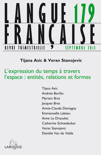
LANGUE FRANCAISE
Scope & Guideline
Unveiling the Nuances of Francophone Discourse
Introduction
Aims and Scopes
- Linguistic Analysis and Theory:
The journal publishes research that delves into the theoretical aspects of linguistics, including syntax, morphology, and semantics, often exploring complex constructions and their implications in the French language. - Sociolinguistic Perspectives:
A significant focus is placed on sociolinguistic studies, examining how language varies and changes across different regions and social contexts within the Francophone world. - Multilingual and Cross-Cultural Studies:
The journal encourages research that looks at the interactions between French and other languages, particularly in multilingual settings, contributing to our understanding of language contact phenomena. - Historical and Diachronic Linguistics:
There is a notable interest in the historical evolution of the French language, with studies that track linguistic changes over time, including the diachronic analysis of specific linguistic features. - Language Usage and Pragmatics:
Research on language usage, pragmatics, and discourse analysis is prevalent, focusing on how language functions in real-life communication, including oral and written forms.
Trending and Emerging
- Exemplification and Cognitive Linguistics:
An increasing number of studies focus on exemplification within linguistic structures, employing cognitive linguistics to understand how examples function in communication and reasoning. - Inclusive Language and Gender Studies:
Research examining the use of inclusive language and gender representation in French has gained traction, reflecting broader societal discussions on gender and linguistic equity. - Digital Linguistics and Social Media Analysis:
There is a growing interest in the impact of digital communication platforms like Twitter and YouTube on language use, particularly in informal and evolving linguistic practices. - Language Variation and Identity:
Emerging studies are focusing on the interplay between language variation and identity, exploring how speakers navigate their linguistic choices in relation to their social identities. - Interdisciplinary Approaches to Language Studies:
The journal is increasingly publishing interdisciplinary research that combines insights from linguistics, cognitive science, and social theory to provide a more holistic understanding of language phenomena.
Declining or Waning
- Formal Syntax and Traditional Grammar:
Studies that strictly adhere to formal syntactic theories or traditional grammar rules have become less frequent, as researchers increasingly explore more dynamic and usage-based approaches to language. - Prescriptive Approaches to Language:
There seems to be a decline in prescriptive studies that focus on 'correct' language usage, possibly due to a broader acceptance of descriptive linguistics that acknowledges language variation and change. - Narrowly Defined Dialect Studies:
Research focusing exclusively on specific dialects or narrowly defined regional varieties of French appears to be decreasing, as there is a growing emphasis on broader sociolinguistic contexts and interactions.
Similar Journals
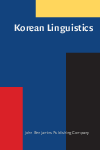
Korean Linguistics
Unveiling the Nuances of Korean LinguisticsKorean Linguistics is a premier scholarly journal dedicated to the exploration and advancement of the field of linguistics, with a specific focus on the Korean language and its various dimensions. Published by John Benjamins Publishing Co., this journal is a vital resource for researchers, linguists, and students seeking to deepen their understanding of Korean linguistics and its contextual significance. With an ISSN of 0257-3784 and an E-ISSN of 2212-9731, Korean Linguistics has gained recognition for its rigorous peer-reviewed articles and contributions to the academic community, evidenced by its current ranking in the third quartile (Q3) of the Linguistics and Language category. The journal aims to foster scholarly dialogue and disseminate innovative research methodologies, theoretical advancements, and empirical studies spanning from 2022 to 2024. Although it does not operate under an open access model, its impact on the understanding of Korean linguistics remains significant, making it an essential publication for anyone keen to engage with contemporary issues and developments in this specialized field.

Catalan Journal of Linguistics
Advancing Understanding in Language Studies.Catalan Journal of Linguistics is a distinguished academic publication dedicated to the dynamic field of linguistics and language studies. Published by the Universitat Autònoma de Barcelona, this open-access journal has been disseminating impactful research since 2002, making significant contributions to the understanding of linguistic theory, language acquisition, and sociolinguistics, particularly within the Catalan language context. With a robust engagement in the scholarly community, it proudly holds a Q2 ranking in Linguistics and Language as of 2023, reflecting its commitment to high standards of research and innovation. The journal is accessible to a global audience, promoting the free exchange of knowledge beyond geographical boundaries, and serves as an essential platform for researchers, professionals, and students aiming to stay at the forefront of linguistic inquiry. With its rich archive of articles, the Catalan Journal of Linguistics stands as a vital resource for anyone keen to explore contemporary linguistic issues and advancements.

Langages
Bridging Theory and Practice in LinguisticsLangages is a premier peer-reviewed journal in the field of linguistics, published by Armand Colin, a reputable French publisher known for its commitment to advancing academic scholarship. With an ISSN of 0458-726X and an E-ISSN of 1958-9549, this journal has been an important platform for linguistic research since its inception in 1976, and it continues to engage with contemporary linguistic debates through to 2024. The journal is ranked in the top two quartiles for linguistics and language, reflecting its significance in the academic community, with a Q2 categorization in 2023, and robust Scopus rankings within the 66th to 69th percentiles across relevant categories. Authors and researchers from around the globe contribute to its rich tapestry of scholarly articles that explore the multifaceted nature of language and its role in society, making Langages an essential resource for linguists, educators, and students alike.
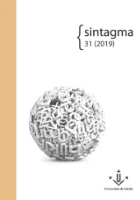
Sintagma
Contributing to the Future of Language Studies.Sintagma is a prominent academic journal dedicated to advancing the field of Linguistics and Language, published by the Universitat de Lleida in Spain. With an ISSN of 0214-9141 and an E-ISSN of 2013-6455, this journal has established itself as an open-access platform since 1989, thereby ensuring wide accessibility and dissemination of research. The journal's commitment to quality is reflected in its ranking within the Q4 quartile of Linguistics and Language in 2021 and a similar standing in Social Sciences and Arts and Humanities, which underscores its emerging importance in these fields despite recent challenges. Covering topics that span theoretical inquiries to applied linguistic studies, Sintagma invites researchers, professionals, and students to contribute to and engage with its evolving landscape from its unique academic perspective. With the convergence of research years from 2011 to 2018 and upcoming issues through 2024, the journal remains poised to provide insightful content that addresses the linguistic dimensions of contemporary society.

NATURAL LANGUAGE & LINGUISTIC THEORY
Exploring the Depths of Linguistic TheoryNATURAL LANGUAGE & LINGUISTIC THEORY, published by Springer, stands as a premier journal in the field of linguistics, characterized by its rigorous examination of theoretical frameworks and current research trends within natural language. With the ISSN 0167-806X and E-ISSN 1573-0859, this journal has maintained a stellar reputation since its inception in 1983, consistently ranked in the Q1 category for Linguistics and Language as of 2023. Its impressive standing in Scopus ranks (#127 in Arts and Humanities and #143 in Social Sciences) further underscores its influence, occupying the 88th and 87th percentiles respectively. Although the journal does not provide Open Access options, it remains a vital resource for scholars and practitioners seeking to deepen their understanding of the nuances of linguistic theory. The journal's scope encompasses a wide array of topics relevant to both theoretical analysis and practical applications in linguistics, making it essential reading for anyone engaged in the study of language sciences.
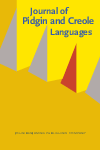
JOURNAL OF PIDGIN AND CREOLE LANGUAGES
Illuminating the Intersection of Language and SocietyJOURNAL OF PIDGIN AND CREOLE LANGUAGES, published by John Benjamins Publishing Co, is a leading international journal dedicated to the study of pidgin and creole languages, offering a unique platform for interdisciplinary research within the fields of linguistics and language studies. With an impressive impact factor reflected in its 2023 Scopus rankings—placing it in the Q2 category for both Linguistics and Language—this journal has established itself as an essential resource for academics and practitioners alike. Covering a broad temporal scope from 1986 to 2024, it promotes innovative research that advances the understanding of language evolution, socio-linguistics, and cultural dynamics. The journal’s focus on both theoretical and practical perspectives makes it particularly valuable for researchers, professionals, and students interested in the complexities of language and identity. Although it does not currently offer Open Access, its commitment to quality scholarship ensures that each issue presents cutting-edge research and critical insights into the world of pidgins and creoles.

DEUTSCHE SPRACHE
Unraveling the Nuances of the German LanguageDEUTSCHE SPRACHE, published by Erich Schmidt Verlag, is a pivotal journal dedicated to the intricate study of the German language. With its ISSN 0340-9341 and E-ISSN 1866-5233, this publication serves as a vital resource for linguists, educators, and language enthusiasts alike. Spanning diverse topics within the fields of linguistics and language, psychology, and social sciences, the journal has earned a Q3 ranking in Linguistics and Language, alongside a Q4 ranking in both Psychology (miscellaneous) and Social Sciences (miscellaneous) as of 2023. Although the journal is not Open Access, it provides invaluable insights on the developments in German language research from its convergence years of 2002 to 2011 and 2017 to 2023. Positioned in Berlin-Tiergarten, Germany, DEUTSCHE SPRACHE continues to expand its influence and accessibility to researchers, professionals, and students keen on understanding the nuances of linguistic expression in the German language.

Revista de Investigacion Linguistica
Connecting scholars through the richness of linguistic inquiry.Revista de Investigacion Linguistica is a distinguished open-access journal dedicated to the exploration and advancement of linguistic research, published by the University of Murcia since its inception in 1997. With the ISSN 1139-1146 and E-ISSN 1989-4554, this journal serves as a vital resource for linguistics scholars and enthusiasts around the globe. Located in the vibrant city of Murcia, Spain, the journal aims to foster academic discourse by disseminating high-quality research that covers a broad spectrum of linguistic topics, including syntax, semantics, phonetics, and sociolinguistics. Its commitment to open access ensures that knowledge is freely available, promoting a wider reach and impact in the academic community. By contributing to the advancement of linguistic studies, the Revista de Investigacion Linguistica plays a crucial role in shaping contemporary linguistic theories and practices, making it an essential publication for researchers, professionals, and students alike.
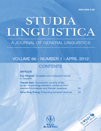
STUDIA LINGUISTICA
Exploring the Depths of Linguistic InsightSTUDIA LINGUISTICA is a prestigious journal published by Wiley, focusing on the dynamic and multifaceted fields of Linguistics and Language. With an ISSN of 0039-3193 and an E-ISSN of 1467-9582, the journal has been a vital resource for academics since its inception in 1947, diligently converging insights from history and philosophy of science alongside contemporary linguistic research. Demonstrating excellent scholarly impact, STUDIA LINGUISTICA proudly holds a Q1 ranking in Linguistics and Language as well as a Q2 in History and Philosophy of Science as of 2023, indicating its significance within these academic domains. Furthermore, it ranks in the top percentiles among similar journals, with a commendable 73rd percentile in Language and Linguistics and 70th in related social sciences. Although it does not offer Open Access, its contribution to the discourse of language studies is underpinned by rigorous peer-review processes and commitment to advancing theoretical and empirical research. For researchers, professionals, and students alike, STUDIA LINGUISTICA remains an essential platform for disseminating impactful linguistic scholarship worldwide.

Revue Roumaine de Linguistique-Romanian Review of Linguistics
Connecting Researchers through Language Insights.Revue Roumaine de Linguistique-Romanian Review of Linguistics, published by EDITURA ACAD ROMANE, is a distinguished journal dedicated to advancing the field of linguistics and promoting scholarly discourse in language-related research. With its ISSN 0035-3957, this journal has established itself as a valuable resource for researchers and practitioners alike, particularly within the linguistics and language categories where it holds a respectable Q3 ranking as of 2023. The journal covers a wide array of topics, focusing on both theoretical and applied linguistics, making it an essential platform for those interested in the latest developments, methodologies, and findings in the field. Although it currently does not operate under an open access model, the Romanian Review of Linguistics remains an impactful publication with its regular convergence of years from 2010 to 2023, providing a comprehensive archive for ongoing research endeavors. With its address located in Bucuresti, Romania, this journal continues to foster a vibrant academic community and supports the ongoing exploration of linguistic phenomena across diverse contexts.